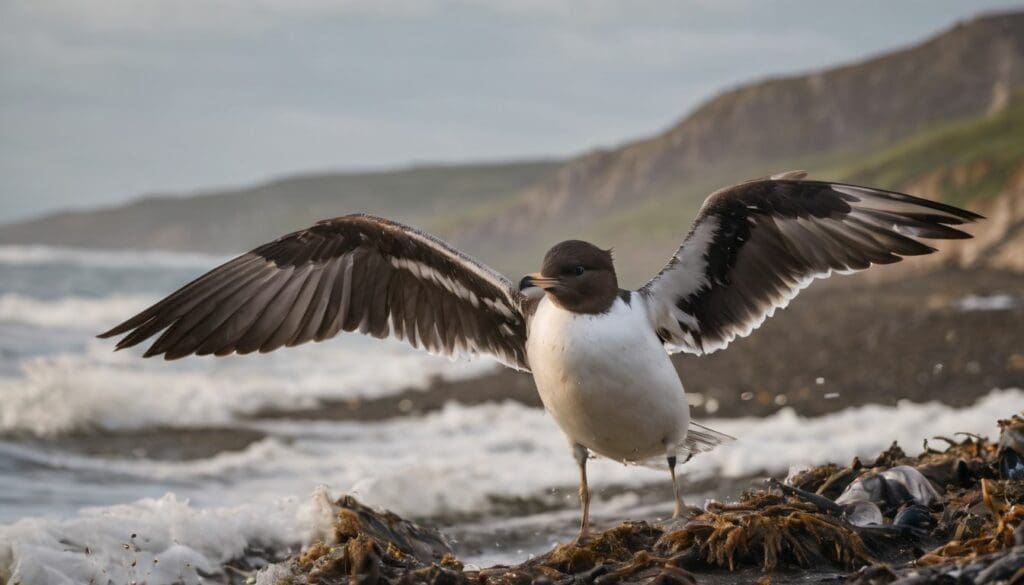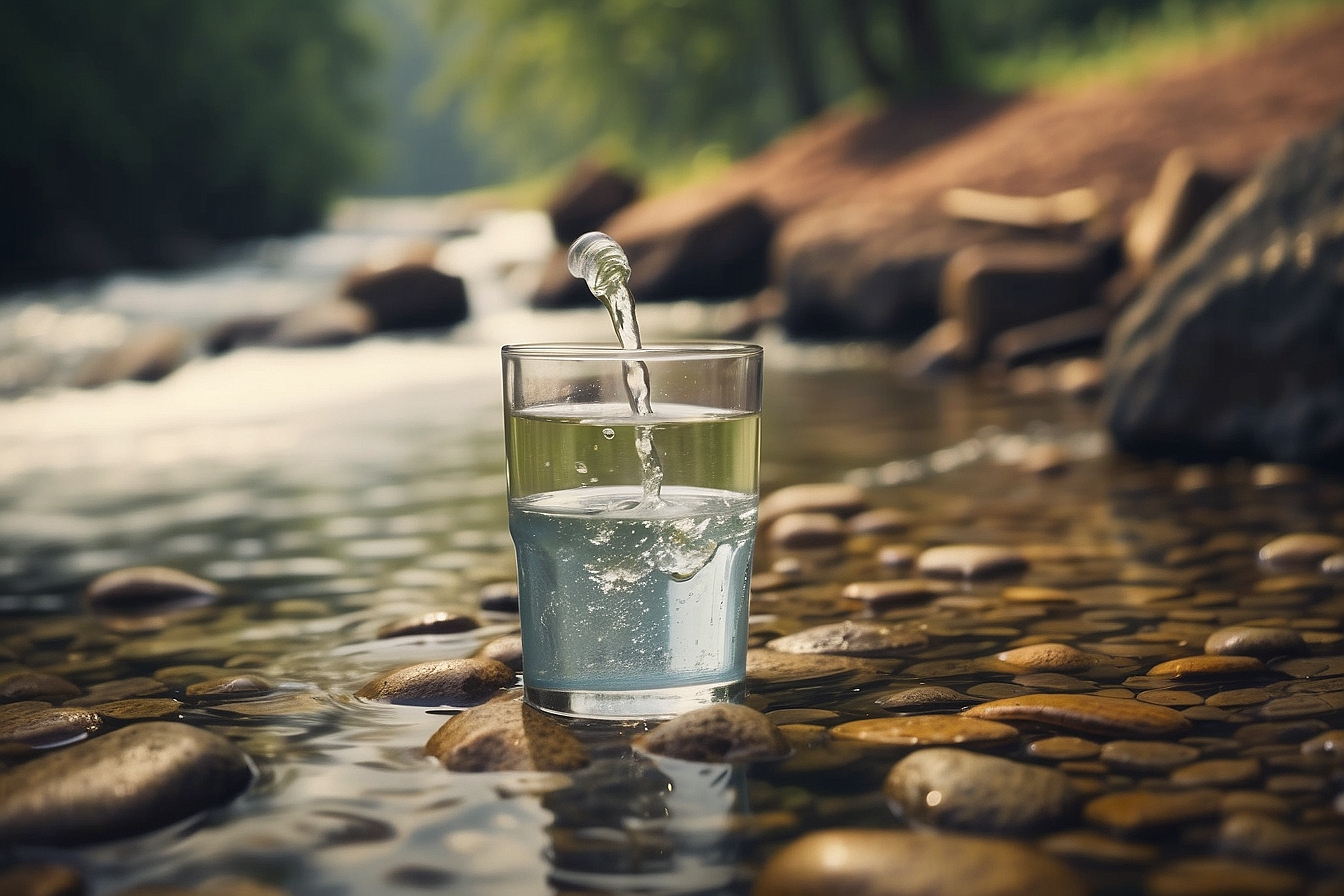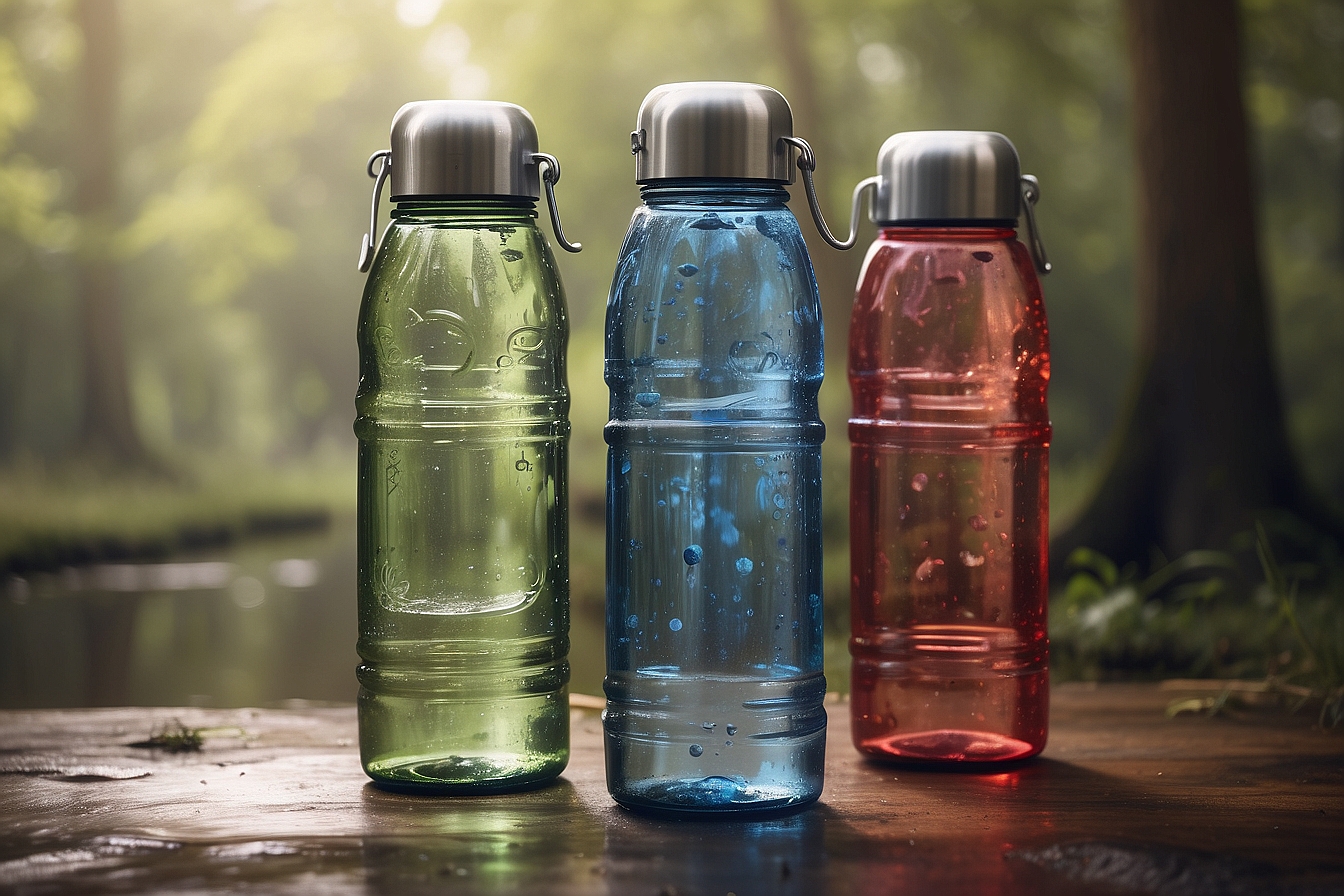We’ve all been witness to the truly gut-wrenching scenes of oil-draped wildlife and despoiled shores that follow an oil spill. Like you, our hearts are heavy with the consequence these catastrophes inflict on our oceans’ denizens; research indicates that even minimal quantities of oil can spell disaster for marine creatures.
Our team has taken a deep dive into this critical concern, shedding light on the harsh truths whilst exploring what measures we can put in place to shield our underwater companions.
Join us as we unravel how collective effort and commitment can hold back this maritime menace—read on for a glimmer of optimism in the shadow of despair.
Key Takeaways
- Oil spills can directly harm marine life by causing reduced growth, liver enlargement, changes in heart and respiration rates, and fin erosion. These conditions lead to a greater struggle for survival among affected species.
- Indirectly, oil contamination disrupts marine communities and ecosystems, leading to reduced fitness through sublethal effects such as impaired reproduction, lowered immune resistance, and less energy storage.
- The severity of an oil spill’s impact on marine life depends on factors like the type of oil spilled, its location and severity of the spill, as well as the kind and sensitivity of the ocean creatures involved.
- Some of the worst historical oil spills include Deepwater Horizon in the Gulf of Mexico; these have led to significant ecological damage highlighting the need for better prevention methods.
- To protect marine environments from future spills it is essential to develop improved response strategies alongside promoting stringent transportation regulations, alternative energy sources, public education on spill effects, and company accountability.
Direct Effects of Oil Spills on Marine Life
Oil spills can have direct and devastating effects on marine life, including reduced growth, enlarged livers, changes in heart and respiration rates, and fin erosion. These impacts can seriously harm the health and survival of ocean creatures.
https://www.youtube.com/watch?v=uy8gRS18DXI
Reduced growth
Exposure to oil spills severely hampers the growth rate of marine creatures. Our oceanic friends struggle as the toxic substances from crude oil disrupt their developmental processes, leading to stunted growth across various species.
This isn’t just about smaller fish or thinner crustaceans; it signifies a deeper imbalance in the marine ecosystem that can echo up and down the food chain.
We see juvenile sea life particularly affected, with their size and weight not reaching full potential due to the poisonous environment created by oil contaminants. Their inability to grow affects not only their survival chances but also impacts breeding patterns and longevity, posing a serious threat to aquatic habitats and marine biodiversity at large.
Without fully developed marine animals, our oceans face decreased resilience against environmental changes and an uncertain future for all who rely on these waters for sustenance, both underwater and above.
Enlarged livers
Oil spills have a detrimental impact on marine life, causing various health issues in sea creatures. One effect is the enlargement of livers due to exposure to oil contaminants. This condition can lead to liver dysfunction and compromise the overall well-being of marine organisms affected by oil pollution.
The consequences of enlarged livers highlight the urgent need for better prevention and mitigation strategies to protect marine life from the harmful effects of oil spills. However, there are other direct effects such as reduced growth and changes in heart and respiration rates that also require attention if we want to safeguard our oceans for future generations.
Moving forward, let’s explore how these adverse effects further disrupt marine ecosystems and communities.
Changes in heart and respiration rates
Oil spills affect marine life by causing changes in heart and respiration rates. The toxic components of oil can impair the ability of marine animals to breathe properly, leading to an increase in their heart rate as they struggle for oxygen.
This puts immense stress on their bodies, making it difficult for them to survive in contaminated waters. Additionally, prolonged exposure to oil pollutants further exacerbates respiratory issues, impacting the overall health and well-being of marine organisms.
Oil contaminating oceans triggers detrimental changes in heart and respiration rates among marine creatures. It leads to a hazardous rise in their heartbeat as they battle for clean air due to limited oxygen availability caused by the toxic elements present in oil spills.
Fin erosion
After experiencing changes in heart and respiration rates, marine life may also suffer from fin erosion due to oil spills. This occurs when the chemicals in the oil damage the tissues of fish fins, leading to deterioration and deformities.
The inability of affected fish to swim effectively can hinder their ability to feed and escape predators, ultimately impacting their survival and contributing to disruptions within the marine ecosystem.
To combat this issue, it is crucial for us as environmentally conscious individuals to support efforts aimed at preventing oil spills from occurring in the first place, as well as advocating for improved response techniques that can reduce the impact on marine life when spills do happen.
Indirect Effects of Oil Spills on Marine Life
Disruption of marine communities and ecosystems can have long-term consequences on the overall health and balance of ocean ecosystems, leading to reduced fitness through sublethal effects.
If you want to know more about how oil spills impact marine life, keep reading!
https://www.youtube.com/watch?v=SA-_KRTDVLU
Disruption of marine communities and ecosystems
Oil spills disrupt marine communities and ecosystems, leading to widespread harm to marine life. The release of oil into the ocean can cause long-term damage, affecting the delicate balance of underwater environments.
Due to the toxicity of oil, various species within these ecosystems may experience harmful effects such as habitat destruction and loss of food sources. Additionally, the contamination can lead to reduced reproductive success and overall population decline for many species.
Marine organisms face mortality due to exposure to oil pollution, further disrupting the intricate web of interactions within their habitats. This disruption could have a ripple effect on other components of the ecosystem, creating a cascade of negative impacts on biodiversity and ecosystem functioning.
Reduced fitness through sublethal effects
Oil spills lead to reduced fitness in marine life through sublethal effects. These effects include impaired reproduction, lowered immune response, and decreased energy storage. Marine organisms affected by oil spills have a diminished ability to survive in their environment due to these sublethal impacts.
Additionally, the long-term health and survival of populations are threatened as a result.
Sublethal effects can persist for generations and further contribute to the decline of wildlife populations. As environmentally conscious individuals, understanding these consequences underscores the urgent need for improved prevention measures and effective mitigation strategies to safeguard marine ecosystems from the detrimental impact of oil spills.
Factors Influencing the Degree of Impact of Oil Spills on Marine Life
The degree of impact of oil spills on marine life can be influenced by factors such as the type of oil spilled, the location and severity of the spill, and the type and sensitivity of the marine life affected.
To learn more about these factors and their effects, keep reading!
Type of oil spilled
Different types of oil can have varying impacts on marine life. Lighter oils, such as diesel and gasoline, evaporate more quickly but can still harm marine organisms through direct contact.
Heavier oils like crude oil are slower to degrade and tend to sink in the water, impacting creatures living at the ocean floor. These heavier oils also pose a greater risk of coating and suffocating aquatic animals and plants.
The degree of toxicity also varies between different types of oil spills, with some containing higher levels of harmful chemicals that can disrupt normal biological processes in marine species.
Location and severity of the spill
When considering the impact of oil spills on marine life, the location and severity of the spill are crucial factors. The extent and distance to which an oil spill spreads can determine its effect on different marine ecosystems.
A spill near the coast can lead to immediate environmental damage, while spills in open waters may take longer to have visible effects but can be equally devastating. Another critical aspect is the amount of oil released, as larger spills have a more severe impact on marine habitats and wildlife compared to smaller ones.
Understanding these variables enables us to develop better strategies for prevention, response, and mitigation when addressing oil spills in our oceans.
The severity of an oil spill also plays a significant role in determining the level of harm caused to marine life. When assessing severity, factors such as the type of oil spilled, ocean currents, weather conditions, and timing all come into play.
Type and sensitivity of the marine life
Different types of marine life respond to oil spills in different ways. For example, fish eggs and larvae are particularly sensitive to oil contamination, which can affect their development and survival.
Larger animals such as sea otters or birds may suffer from hypothermia when their insulation is compromised due to oil exposure. Moreover, marine mammals with blubber may suffer less immediate harm compared to species without this natural protection.
Marine life in certain environments, such as estuaries or areas with high biodiversity, are more sensitive to the impacts of an oil spill. These regions serve as nurseries for numerous marine organisms and disruptions here can have far-reaching consequences throughout the food web.
History of Oil Spills in the Ocean
The history of oil spills in the ocean is riddled with devastating environmental disasters, such as the notorious Deepwater Horizon spill in the Gulf of Mexico and other notable spills worldwide.
These incidents have left a lasting impact on marine life, prompting the need for improved prevention and mitigation strategies.
Gulf of Mexico
The Gulf of Mexico has witnessed some of the most devastating oil spills in history, causing significant harm to marine life and ecosystems. The 2010 BP Deepwater Horizon oil spill, for example, released approximately 210 million gallons of crude oil into the Gulf, resulting in extensive damage to fish, shellfish, sea turtles, birds, and other wildlife.
The spill also negatively impacted coastal wetlands and deep-sea corals in the area. Such catastrophic events highlight the urgent need for improved preventative measures and effective response strategies to mitigate the effects of future oil spills on marine life.
Furthermore, consider that the environmental impact of oil spills extends far beyond immediate mortality rates among marine organisms as it can lead to long-term ecological consequences affecting entire communities.
Other notable spills
After the Gulf of Mexico disaster, other notable oil spills have had severe impacts on marine life. The Exxon Valdez spill in Alaska led to extensive harm to wildlife and their habitats, demonstrating the devastating consequences of such disasters.
Furthermore, the MV Braer spill off the Shetland Islands resulted in a significant loss of seabirds and marine organisms, highlighting the widespread ecological damage caused by oil spills.
These incidents serve as stark reminders of the urgent need for preventive measures and effective response strategies to protect our precious marine ecosystems from further devastation.
Prevention and Mitigation of Oil Spill Effects on Marine Life
Improved oil spill response and clean-up techniques have been developed to minimise the impact of oil spills on marine life. Strict regulations on oil transportation, promoting alternative energy sources, educating the public on the effects of oil spills, and increased accountability for companies responsible for spills are also crucial in preventing and mitigating the effects of oil spills on marine life.
Improved oil spill response and clean-up techniques
Oil spill response and clean-up techniques have significantly advanced, enhancing our ability to mitigate the impact on marine life. New technologies such as mechanical skimmers, absorbent materials, and chemical dispersants are now in use to contain and remove oil from affected areas.
Additionally, controlled burning has proven effective in reducing the amount of oil on the water’s surface. These improved techniques help prevent further harm to marine life by swiftly addressing oil spills.
Furthermore, research into bioremediation, which uses microorganisms to break down oil, offers a promising natural solution for cleaning up contaminated habitats.
Implementing these innovative strategies not only helps protect marine ecosystems but also minimises long-term consequences for wildlife affected by oil spills. By continually improving our response capabilities and clean-up methods, we can better safeguard oceanic environments against the devastating effects of oil pollution.
Moving forward with more sustainable practices is crucial in preserving our oceans and protecting marine life from future disasters such as oil spills.
Strict regulations on oil transportation
Implementing strict regulations on oil transportation is crucial to prevent oil spills and protect marine life. These regulations ensure that companies adhere to safe and responsible practices when transporting oil, reducing the risk of accidental leaks or spills into marine habitats.
By enforcing stringent rules for vessel maintenance, crew training, and inspection protocols, we can significantly minimise the potential for devastating ecological disasters caused by oil pollution in our oceans.
In addition to safeguarding marine ecosystems, these regulations also promote accountability among companies involved in oil transportation. Companies are required to adopt advanced technologies and techniques that mitigate the impact of any potential spills.
Promoting alternative energy sources
We can promote alternative energy sources like wind, solar, and hydroelectric power to reduce our reliance on oil and minimise the risk of future spills. Investing in renewable energy technologies helps decrease the demand for oil extraction and transportation, ultimately safeguarding marine ecosystems from potential devastation due to oil spills.
By advocating for policies that support the development and implementation of clean energy initiatives, we can work towards a more sustainable future for our oceans and the diverse wildlife they support.
Furthermore, raising awareness about the benefits of alternative energy sources among communities is crucial in gaining widespread support for transitioning away from traditional fuel sources.
Educating the public on the effects of oil spills
Educating the public on the harmful effects of oil spills is crucial for raising awareness about marine pollution and its devastating impact on wildlife and ecosystems. By spreading knowledge about the consequences of oil leaks in our oceans, we can encourage individuals to support conservation efforts and advocate for stricter regulations on oil transportation.
Promoting alternative energy sources can also play a significant role in preventing future oceanic disasters caused by oil spills.
Increasing accountability for companies responsible for spills is another essential aspect of educating the public. By holding these entities responsible, we create a sense of urgency around preventing further harm to marine biodiversity and ocean habitats.
Increased accountability for companies responsible for spills.
Companies responsible for spills must be held accountable for their actions. Implementing strict regulations and consequences will deter negligence and ensure that preventative measures are taken seriously.
Holding these companies accountable will act as a strong deterrent, encouraging them to invest in advanced spill response and clean-up techniques, reducing the impact of potential future spills on marine life.
Additionally, increased accountability can promote transparency and responsibility among oil companies. By making it clear that any spills will have significant financial penalties and legal repercussions, these companies will be incentivised to prioritise safety and environmental protection in all aspects of their operations.
Conclusion
Prevention and mitigation techniques, such as improved oil spill response and clean-up methods, strict regulations on oil transportation, promoting alternative energy sources, educating the public on the effects of oil spills, and increased accountability for those responsible are crucial.
Strict adherence to these measures will reduce the devastating impacts of future oil spills on marine life. By working together as a global community to protect our oceans and the creatures that inhabit them, we can ensure a healthier environment for future generations.
FAQs
1. What happens to marine life when there is an oil spill?
Oil spills cause major ecosystem disruption, with harmful effects on marine animals such as hypothermia risk in birds and contamination of wildlife habitats.
2. How do oil release effects impact ocean creatures?
The adverse effects of oil pollution include damage to the marine ecosystem and serious consequences for the health and survival of ocean creatures.
3. Can we prevent oil spills from damaging marine life?
Yes, implementing effective oil spill prevention strategies can help protect marine biodiversity by reducing the likelihood of these devastating events.
4. What does clean-up after an oil spill involve?
Oil spill clean-up involves removing the spilled oil from the ocean and taking steps to minimise further pollution and harm to sea life.
5. Does an oil spill have long-term impacts on marine habitats?
The impact of oil leaks can result in long-lasting devastation on sea life and their habitats, altering food chains and affecting overall marine ecosystem health.





